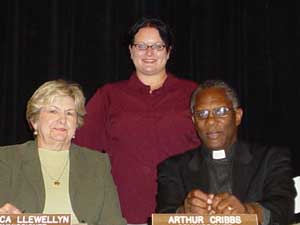-
- Judge rules being called ‘homosexual’ is not libelous
- Gay Republican group protests GOP push to ban same-sex marriage
- Philadelphia airs one of first commercials to attract gay and lesbian tourists
- Gay and lesbian Catholics denied communion at Chicago Mass
- Wilton Manors emerges as a gay mecca
- Internet scammer, using best-selling fraud, gets 33 months
- National News Briefs
- World News Briefs
san diego
San Francisco-style ordinance proposed to city commissioners
Policy would forbid city from contracting with companies that do not offer domestic partnership benefits
Published Thursday, 10-Jun-2004 in issue 859
Dr. Linda Barufaldi, a local chiropractor and member of the mayor’s LGBT Advisory Board, presented a proposal for the City of San Diego to adopt an Equal Benefits Ordinance at the monthly meeting of the Citizen’s Equal Opportunity Commission (CEOC), at The Center on June 2. The CEOC is a community outreach advisory board to the San Diego City Council.
“These [equal benefits] laws have been tested in the courts and found to be strong,” Barufaldi told the commission. “Instituting an Equal Benefits Ordinance in San Diego is within our reach and it’s the right and fair thing to do.”
Equal Benefits Ordinances, or EBOs, prohibit cities from entering into contracts with companies that do not offer equal benefits – specifically those offered to domestic partners of employees – and declare that public funds must not be spent on businesses that do not comply with the ordinance. San Francisco was the first city to adopt an EBO, in 1997. Since then, Los Angeles, Seattle, Berkeley, Oakland, San Mateo County, Minneapolis and Portland, Maine, have followed suit.
“Of course, if same-sex marriage were legalized, the point would be moot,” Barufaldi said. “But the purpose of the Equal Benefits Ordinance is to secure benefits for employees with domestic partners until [same-sex] marriage is legal. When employees are working for unequal wages and unequal compensation – when a married person is allowed to insure their spouse … that person is getting more of a benefit of the job than a person with a domestic partner who may not be allowed to insure their spouse at the same rate.”
The recent passage of AB 17, the Equal Benefits in State Contracting Act, prohibits state agencies from contracting with companies that fail to provide equal benefits to employees with spouses and employees with domestic partners. The bill, authored by Assemblymember Christine Kehoe and sponsored by Equality California, was signed into law by Governor Gray Davis before he left office and will go into effect January 1, 2007.
AB 17 changes Section 1, paragraph (g) of the Public Contract Code to read, “Nothing in this section is intended to regulate the contracting practices of any local jurisdiction.” The bill does not require the compliance of companies that do not already offer benefits to the spouses of employees.
Approximately 163 state and local governments across the U.S. offer domestic partner benefits, including California. AB 17 will require all cities in California to implement a policy similar to an Equal Benefits Ordinance at that time.
Barufaldi highlighted the importance of having GLBT-friendly staff assigned the task of administering an EBO. Without such direction, she said, problems with compliance and enforcement may arise. “Obviously, there would be problems if enforcement were left to people who are indifferent or hostile to our community. It could be easy to look the other way on enforcement.”
Barufaldi presented the commission with the results of a study showing that it costs companies one-tenth of 1 percent over usual healthcare costs to adopt the policy, and that the portion of that amount passed on to the cities participating in the study was between 2 and 12 one-hundredths of 1 percent. She also cited a recent Associated Press story reporting that the number of U.S. employers who offer benefits to same-sex domestic partners increased by 16 percent in 2003, to almost 6,000 companies nationwide.
“In addition to not very much money getting passed through to the city, the fact that they provide health insurance to those that are currently uninsured … makes our healthcare institutions more stable and increases public healthcare for the common good, which is one of the goals of city government,” Barufaldi said.
The approximate number of employees in San Diego County that would benefit from the proposed EBO was not immediately known.
The CEOC voted to discuss the pros and cons of adopting an EBO at their next meeting, and may list the proposed ordinance as an item on next month’s agenda. If approved by the CEOC, the proposal will be brought before the city council for consideration.
|
|
Copyright © 2003-2025 Uptown Publications


